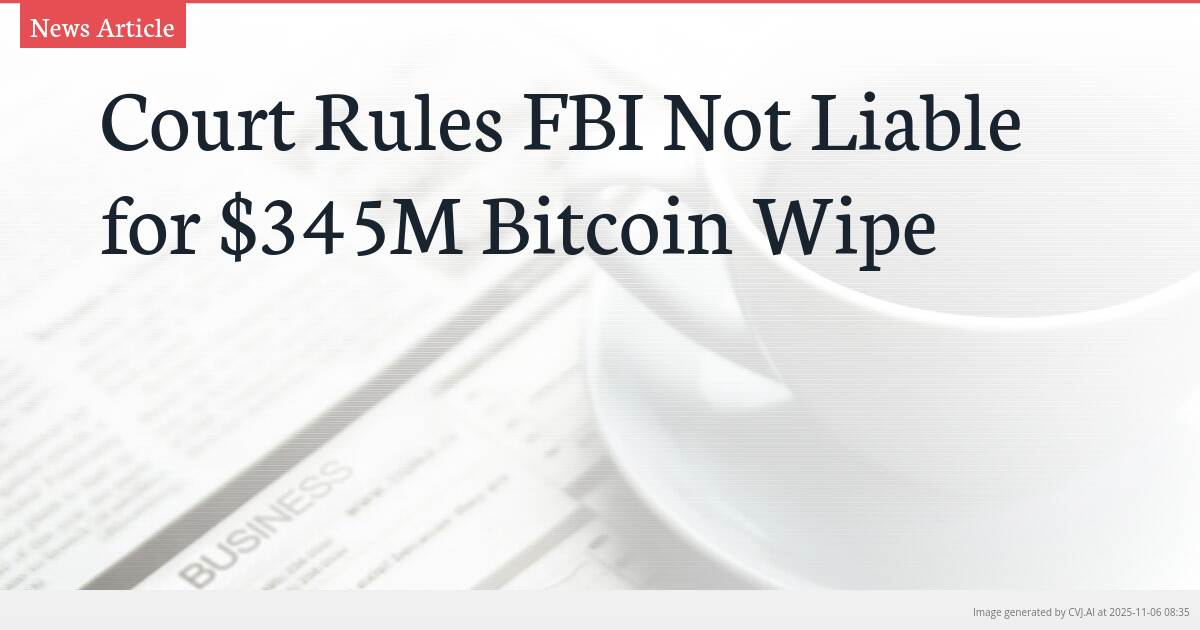This summary text is fully AI-generated and may therefore contain errors or be incomplete.
Introduction
A US appeals court has delivered a landmark ruling that the FBI bears no responsibility for wiping a hard drive containing 3,443 Bitcoin now valued at $345 million, dealing a devastating blow to convicted identity thief Michael Prime. The Eleventh Circuit Court of Appeals found that Prime’s initial denial of cryptocurrency ownership during legal proceedings fundamentally undermined his subsequent claim for recovery, establishing a critical precedent for digital asset declaration requirements in federal cases.
Key Points
- Plaintiff initially denied owning the 3,443 Bitcoin during legal proceedings, undermining his later claim
- The FBI followed standard evidence handling procedures when wiping the seized hard drive
- The ruling establishes precedent for cryptocurrency ownership declaration requirements in legal cases
The $345 Million Legal Reversal
In a decision that underscores the precarious legal standing of undeclared digital assets, a three-judge panel at the Eleventh Circuit Court of Appeals has unanimously rejected Michael Prime’s lawsuit seeking compensation for 3,443 Bitcoin wiped from a seized hard drive. The ruling represents a complete legal reversal for Prime, who served prison time for identity theft before filing his claim upon release in July 2022. The court’s determination hinged on a fundamental contradiction: while Prime now claims ownership of cryptocurrency worth hundreds of millions, he previously told government authorities he didn’t own that amount of crypto during earlier legal proceedings.
The timing of Prime’s claim highlights the extraordinary appreciation of Bitcoin values over the past decade. When the hard drive was originally seized, the 3,443 BTC would have been worth substantially less than its current $345 million valuation. This massive appreciation likely motivated Prime’s post-incarceration legal action, though the appeals court found his belated ownership assertion legally insufficient to overcome his previous denials.
FBI Procedures and Legal Accountability
The court’s ruling explicitly endorsed the FBI’s evidence handling protocols, noting that the agency wiped the hard drive containing the Bitcoin as part of its standard procedures for managing seized digital evidence. This finding provides significant protection for law enforcement agencies dealing with rapidly evolving digital asset classes, establishing that properly documented evidence management protocols can shield agencies from liability even when potentially valuable assets are destroyed.
Legal experts note this case establishes a critical distinction between physical and digital asset seizure protocols. While traditional asset forfeiture procedures require specific documentation and preservation methods for physical property, digital assets like Bitcoin present unique challenges. The court’s acceptance of standard FBI digital evidence procedures suggests that cryptocurrency holders bear primary responsibility for declaring and documenting their ownership claims during legal proceedings.
The ruling also highlights the tension between law enforcement’s need to manage vast quantities of digital evidence and cryptocurrency owners’ property rights. By affirming that Prime’s failure to properly declare his Bitcoin ownership relieved the FBI of preservation responsibilities, the court placed the burden of disclosure squarely on asset owners, even when those assets exist solely in digital form.
Broader Implications for Cryptocurrency Ownership
This Eleventh Circuit decision establishes a potentially far-reaching precedent for cryptocurrency litigation and asset recovery claims. The ruling emphasizes that digital asset owners must formally declare their holdings to government authorities during legal proceedings or risk forfeiting future claims. This requirement applies particularly in cases where assets are seized as evidence, creating a clear legal obligation for cryptocurrency holders to document their ownership claims contemporaneously.
The case also illustrates the complex evidentiary challenges surrounding Bitcoin and other cryptocurrencies. Unlike traditional financial assets with clear paper trails and institutional custody, cryptocurrency ownership often depends on private keys stored on personal devices. The court’s ruling suggests that claimants must provide adequate proof of ownership during initial legal interactions rather than attempting to assert rights years later, as Prime did following his prison release.
For the broader cryptocurrency industry, this ruling serves as a stark reminder of the legal vulnerabilities facing digital asset holders. The decision reinforces that cryptocurrency ownership carries specific legal responsibilities, particularly when interacting with government agencies. As digital assets continue to gain mainstream acceptance, this case will likely influence how courts handle similar disputes involving undeclared cryptocurrency holdings in legal proceedings.
📎 Read the original article on cointelegraph.com

